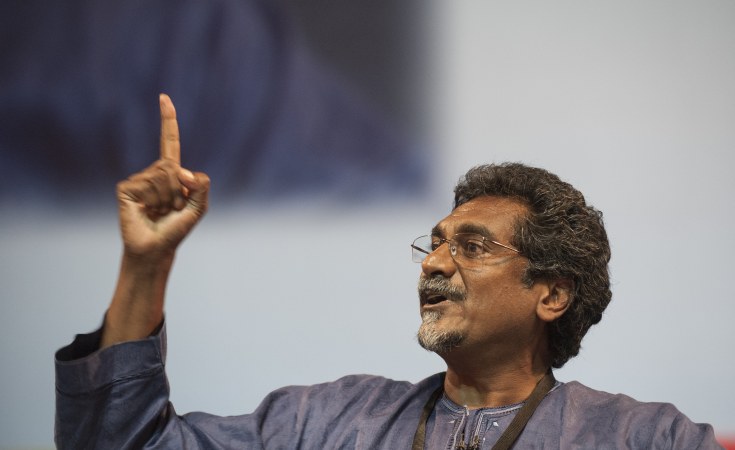The government has been quick to suppress The Global Week of Action for Swaziland, which has mobilised regional and international support.
Manzini - Swaziland police are out in force in Manzini, the country's second largest city and centre of recent protests against the absolute monarchy. The police have set up a blockade on the west side of the town and almost every street corner has some form of police presence, uniformed and plain clothes.
The government's actions are in response to 'The Global Week of Action for Swaziland', a week of protest demanding greater democratic and worker rights in the country, supported by the international trade union movement. The State's response to the pro-reform and trade union activists was swift and pre-emptive. Throughout yesterday, activists and advocates were followed and recorded by plain clothes police. Then, Vincent Ncongwane, General Secretary of the Trade Union Congress of Swaziland (TUCOSWA), was arrested in his office by ten police as he prepared to lead his members in protest. No warrant was produced.
"This is an example of the continued harassment of labour leaders that we regularly experience in Swaziland, particularly around the time of the Global Week of Action for Swaziland," said Ncongwane, of his arrest. "The government is trying to intimidate people, especially when they learned of our planned Global Inquiry Panel."
The panel, organised by the International Trade Union Confederation (ITUC), which was planned to take place this morning, brought in foreign solidarity figures like Paul Verrynn, Jay Naidoo, and the German Trade Union Federations. The panel aimed to hear from Swazi workers about commonplace labour violations in the country.
"This is what we have always been saying," Ncongwane continues. "The state tries to intimidate people from engaging in trade union activities. They knew both local working people and foreign trade unionists would come to the global inquiry and for that they increase harassment."
Foreign allies targeted
Paliani Chinguwo is a researcher for the Southern African Trade Union Coordination Council (SATUCC) and one of the activists detained. He told Think Africa Press that it is foreign support for the Action Week that has got the government so nervous. "In this day and age, when we are talking about human rights, workers rights, freedom of association, and you arrive in a country, you are immediately detained and questioned about why you are coming to the country," he explains.
He argues that the international trade union movement has every right to mobilise within Swaziland. "Why should you justify your meeting with your organisation to hear the voice of the workers?" he asks. "SADC has reached 100% of the International Labour Organisation (ILO) conventions and...Swaziland is a signatory of those conventions, so why must we justify ourselves for engaging with our members?"
Although Swaziland's labour unions are relatively small, they have good relations with regional and international unions. The Congress of South African Trade Unions (COSATU), South Africa's biggest trade union federation, is supporting the Global Week of Action and is arranging a blockade of Swaziland's borders from the South African side today.
This regional solidarity has led to further arrests. High-profile Southern Africans were also detained and questioned, as they arrived to participate in the ITUC-supported panel. Amongst them were: Jay Naidoo, former COSATU Secretary General and cabinet minister under Nelson Mandela, South African Methodist Bishop Paul Verryn and prominent Zimbabwean human rights lawyer Alec Muchadehama. Naidoo and Verryn were later released and placed under house arrest.
Planned panel shut down
This morning, police have done all they can to block the running of the Global Inquiry Panel. Police surrounded the hotel where the event was due to take place and prevented the meeting from starting.
The panel was planned to take place today, the 45th anniversary of Swaziland's independence from British rule. But Independence Day has not been reason for celebration in the repressive regime, as it attempts to block its citizens from protesting in any form. At the ILO Conference this year, Swaziland was on the verge of being reported a 'special paragraph' at the ILO Conference, due to consistent refusal to respect workers' rights to freely associate and assemble. The addition of this special paragraph could potentially put Swaziland's special trade partnerships with the US and the EU in jeopardy.
Despite these concerns, Labour Minister Lutfu Dlamini asserted at the Conference that the Swazi state would implement ILO Conventions and respect the rights of its people to freely assemble. The response to protests in the last two days reveals the emptiness of the minister's words.


